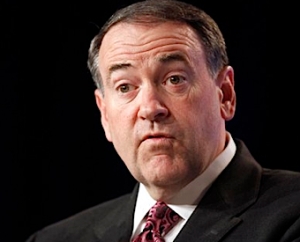Mike Huckabee Blames Colorado Tragedy on Godless Society
July 24, 2012

Image Credited to Gawker.com
In the somber wake of the Aurora, Colorado tragedy last Friday, the country struggles to stay united in a respectful memorial to the victims lost.
A new week has begun, and while those closest to the shooting sit still in mourning, the rest of the country grapples with the natural resolve to problem solve.
Why did this occur? Is there a pattern? How can we keep this from happening again?
It was during a midnight screening of the newly released film Batman: A Dark Knight Rises, that a gunman stormed the theater, shooting all that crossed his path.
He carried in his possession two glock handguns, one Remington Model 870 shotgun, one Smith and Wesson AR-15 Type Rifle, and 6,000 bullets- all of which were purchased legally.
Naturally, the conversation has begun to shift towards an evaluation of the current gun laws and the recently expired ban on assault rifles.
While the NRA and other advocates of a constitutional right of access to guns argue that a policy discussion at this time only politicizes this horror story and distracts from the victims, proponents of gun reform say that we can honor the dead while addressing policy reform in the same breath.
However, former Primary Presidential Candidate Mike Huckabee (R) has completely bypassed the matter of gun control; in fact, it’s a non-issue in his eyes.
Huckabee weighed in on the massacre during his program on the Fox News Channel this weekend. He concluded, “Ultimately, we don’t have a crime problem or a gun problem, or even a violence problem. What we have is a sin problem.”
He went on to say that the assault on religion in this country, specifically Christianity, is to blame for these reoccurring mass murders. He explained, “Since we’ve ordered God out of our schools, communities, the military and public conversations, you know, we really shouldn’t act so surprised when all hell breaks loose.”
But if there’s anything more inappropriate at this point in time, it’s not publicizing the gunman’s name, and it’s not “politicizing” the recent events by discussing whether stricter gun laws will hinder the frequency of similar events; it’s invoking an indubitably political assertion that religion is necessary to guide this country down the right, moral path on issues such as abortion, marriage equality and gun control.
As a Christian, I can definitively attest to the moral compass of too many atheists that I call my friends.
Some of the most good-hearted friends I’ve made live with zero influence of any God in their life, and amazingly, they somehow manage to resist the compulsion to commit such heinous crimes as those we witnessed in Colorado.
The Catholic Church has suffered through the plague of pedophilia, while churches in my own community have fallen victim to sexual exploitation, thievery, and a host of other sins that constantly fly under the radar.
The reality is no one is safe from the complexity of the human mind that can store and recollect memories from decades ago, or forget the most familiar faces and why they’re familiar in the first place.
A mind that is capable of processing powerful feelings of love but also grave notions of fear and loathing.
Whether you have God on your side or not, you can always be a victim, you can always get caught in the crossfire, you can always be hurt.
Instead of pushing some arbitrary, fundamentalist Christian agenda that offers zero intrinsic value in solving the grandest issue of where do we go from here, let’s remember the community of Aurora, the fragility of a moment, and look ahead in search of a true solution.